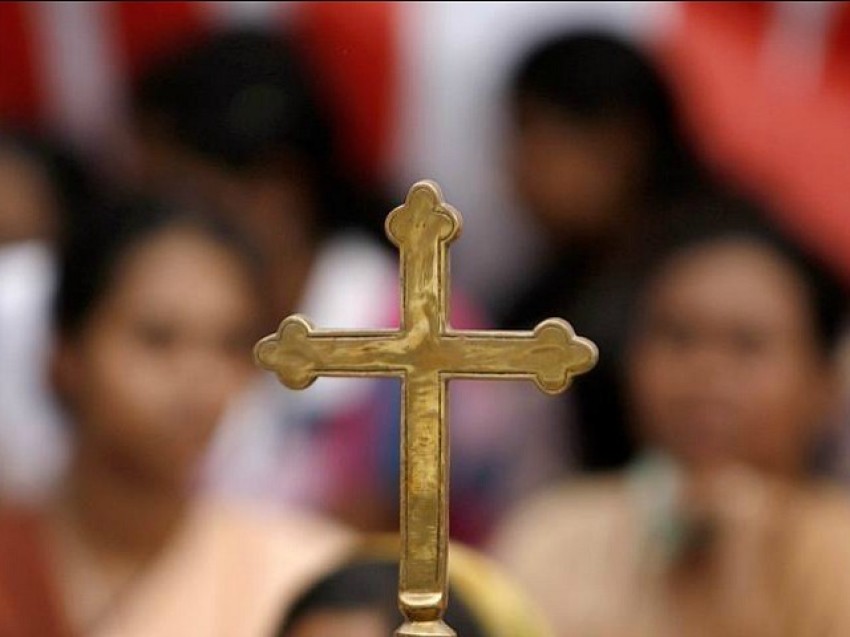Was the Cross really necessary? What does the Bible say about Easter?

Easter is the highest, holiest of holidays for Christians around the world.
We celebrate Jesus’ victory over death and believers’ ultimate salvation because of His atoning sacrifice on the cross for our sin. When we accept Jesus as Lord, we stand cloaked in his blood, righteous before God, and we are declared innocent. We have eternal life in heaven because of the price he paid and the victory he won.
But, like the secularized Christmas holiday, nonreligious elements have found their way into our Easter celebrations, and many who observe it have no idea of its true meaning.
Much of the celebration these days depicts white bunnies and colorful eggs. In the northern hemisphere, it is spring. The warmth is returning and flowers are blooming. It’s a time of renewal and anticipation of the outdoors.
For most Christians, Easter is the celebration of the resurrection of Christ. But many modern-day, less-than-biblical Easter traditions have crept into its observance in western culture. The most popular cultural symbol of this holiday, the Easter Bunny, was likely introduced by the German immigrants who brought their stories of an egg-laying hare with them. Even further back historically, the decoration of eggs at Easter is believed to date back to the thirteenth century or earlier.
Why do we celebrate with the Easter Bunny?
The Easter Bunny has become a prevalent symbol of the springtime Easter holiday. Of course, the Bible makes no mention of any creature who delivers decorated eggs to children on Easter Sunday. So why has it become the prominent symbol of Easter in the US?
No one is completely sure, but rabbits are an ancient symbol of procreation and new life. As stated, the Easter Bunny may have first arrived in America with German immigrants. Their children made nests in which this creature could lay colorful eggs. Over time, the custom spread across the US. Easter morning deliveries by the fabled rabbit expanded to include chocolate and other candies and gifts. Today, decorated baskets replace nests.
Why do we celebrate with Easter eggs?
Easter eggs are sometimes said to represent Jesus’ emergence from the tomb. But Easter eggs are generally linked to more pagan traditions. The egg is an ancient symbol of new life in many cultures. It has often been associated with pagan festivals celebrating spring.
Decorating eggs for Easter dates back to at least the thirteenth century, according to some sources. One explanation for this custom is that eggs were once a restricted food during Lent. So people would sometimes paint and decorate them to celebrate the end of the period of penance and fasting, then eat them at a celebration on Easter day.
White Easter lilies are the unofficial flower of Easter celebrations in the United States. They symbolize the purity of Christ for many Christians and are commonly seen in churches and homes around Easter. Their growth, from dormant bulbs in the ground to flowers, symbolizes the rebirth and hope of Christ’s resurrection.
Why do we have Easter parades and events?
Egg rolling and Easter egg hunts are two popular traditions during this springtime holiday. The White House Easter Egg Roll is an annual event held the Monday after Easter in the US. The first official White House egg roll occurred when Rutherford B. Hayes was president in the late 1870s. While the event has no religious significance, some people consider egg rolling symbolic of the stone being rolled away from the tomb at the time of Jesus’ resurrection.
In New York City, the Easter Parade dates back to the mid-1800s, when well-to-do citizens wearing their new spring outfits and hats attended Easter services at Fifth Avenue churches, then strolled down the street afterward. Average citizens started showing up along Fifth Avenue to observe their finery.
The popular film Easter Parade was released in 1948, starring Fred Astaire and Judy Garland and featuring the music of Irving Berlin. Today, other cities across the US also have their own parades.
Easter processions have been a part of Christianity since its earliest days. While Manhattan’s parade has never had any religious significance, the tradition continued as conditions have allowed, with Fifth Avenue from 49th Street to 57th Street being shut down to traffic during the day.
Should Christian parents allow their children to participate in Easter egg hunts and receive Easter baskets from the Easter Bunny?
The balance Christians face of being in the world but not of the world is never more evident than deciding how deeply to embrace the cultural versions of holidays that have spiritual meaning, particularly Christmas and Easter. Rightly so, protecting our children from worldly influences is always a high priority for Christian parents.
I recommend parents who are struggling to find that balance read two short articles which put this matter in perspective. Several years ago, BaptistPress ran “FIRST-PERSON: What’s a Christian to do with the Easter Bunny?” by Steve Russo. It is relevant and helpful to better understand the issue and how to deal with it.
If Christian parents determine they want to embrace the Easter Bunny and Easter eggs on a limited basis, this Focus on the Family article provides innovative ideas on how to use these symbols to teach children about the faith.
Why does Easter fall on different days?
Have you ever wondered why the date for Easter moves around so much? Why can’t we pick a specific date for Easter, as we do with Christmas? Or, if we want Easter to be on Sunday each year, why not specify a particular one, as we do with observing Thanksgiving on the fourth Thursday of November?
And, calculating the dates of the Lenten season depends on the date of Easter, of course. If you thought Lenten math was confusing, wait until you read how the date for Easter is determined.
Simply, Easter is observed on the Sunday after the first full moon after March 21 — unless that full moon is on a Sunday in which case we wait a week. Not so simple. Here’s how this came to be.
The ancient Jews observed Passover on the fourteenth day of their month Nisan (the first month of their year). Apparently, the first Christians celebrated Easter annually on the day immediately after this Passover event, regardless of the day of the week on which it fell. Those in the Eastern churches perpetuated this tradition, tracing it to St. John the Apostle. Their position was called “Quartodeciman” (from their word for “fourteen”).
However, Christians of Gentile origin wanted their Easter to be on Sunday, whether the day was close to Passover or not. Their sentiments prevailed in the West and became the official position of the Roman Catholic Church. We would think that this disagreement would be minor, but we would be wrong. Pope Victor (late second century) actually excommunicated Polycrates, the bishop of Ephesus, for refusing to comply with the Roman method. The Quartodecimans organized themselves into a separate church and survived as a sect into the fifth century.
The Council of Nicaea (AD 325) once again settled things for Western Christians. They determined that Easter would be celebrated on the first Sunday after the full moon following the vernal equinox. But if this full moon should occur on a Sunday and coincide with the Passover festival, Easter would be commemorated on the next Sunday.
So, as stated above, Easter would be the Sunday after the first full moon after March 21—unless that full moon is on a Sunday, in which case we wait a week. We then back up seven weeks to Ash Wednesday and start Lent—unless we’re in the Orthodox Church, in which case we begin two days earlier.
Aren’t you glad we cleared that up?
What about Lent? Is it relevant today?
This year’s Lenten season began on Ash Wednesday, February 17. While we are already several weeks into this tradition, many who do not observe it often have questions about it. What is it? Is it biblical? Does it really matter?
Let me answer the last question first: yes.
Your soul and mine need what Lent intends to provide. But many of us don’t know much (if anything) about this historic strategy for personal spiritual renewal and growth. This is our loss. While we won’t elaborate here, wouldn’t a spiritual discipline practiced for more than seventeen centuries by the vast majority of Christians be relevant for our souls today?
So, why is Lent relevant for all Christians?
Three reasons for observing some form of Lenten practice suggest themselves, in ascending importance.
One: we need to live in community with the larger body of Christ.
Since the vast majority of Christians practice some form of Lenten observance, joining them in some way is a good step toward solidarity of faith and ministry. This is also an important witness to others, answering Jesus’ prayer, “that they may become perfectly one, so that the world may know that you sent me and loved them even as you loved me” (John 17:23).
Two: we cannot fully appreciate Jesus’ resurrection unless we have experienced something of his sufferings.
A fast of some sort is an appropriate means of spiritual identification with our Lord’s suffering for us.
Three: we need a period each year for intentional spiritual introspection and contemplation.
John R. W. Stott said that he required an hour a day, a day a week, and a week a year to be alone with his Lord. We need a time every year for spiritual renewal. Just as students need a spring break, so do souls. Lent is a wonderful season for such renewal: as the physical world is renewing itself, so should the spiritual.
As I asked above, can a spiritual discipline practiced for more than seventeen centuries by the vast majority of Christians be irrelevant for our souls today? If you will go through a spiritual Lent, you can celebrate a spiritual Easter on earth, and one day in heaven. This is the promise of God.
Originally published at the Denison Forum where you can read the rest of the article
Adapted from Dr. Jim Denison’s daily cultural commentary at www.denisonforum.org. Jim Denison, Ph.D., is a cultural apologist, building a bridge between faith and culture by engaging contemporary issues with biblical truth. He founded the Denison Forum on Truth and Culture in February 2009 and is the author of seven books, including “Radical Islam: What You Need to Know.” For more information on the Denison Forum, visit www.denisonforum.org. To connect with Dr. Denison in social media, visit www.twitter.com/jimdenison or www.facebook.com/denisonforum. Original source: www.denisonforum.org.



























